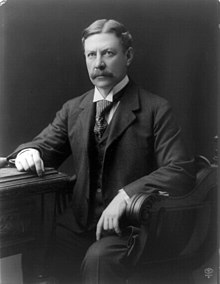William H. Moody
| William Moody | |
|---|---|
 |
|
| Associate Justice of the Supreme Court of the United States | |
|
In office December 12, 1906 – November 20, 1910 |
|
| Nominated by | Theodore Roosevelt |
| Preceded by | Henry Brown |
| Succeeded by | Joseph Lamar |
| United States Attorney General | |
|
In office July 1, 1904 – December 12, 1906 |
|
| President | Theodore Roosevelt |
| Preceded by | Philander Knox |
| Succeeded by | Charles Bonaparte |
| United States Secretary of the Navy | |
|
In office May 1, 1902 – June 30, 1904 |
|
| President | Theodore Roosevelt |
| Preceded by | John Davis Long |
| Succeeded by | Paul Morton |
| Member of the U.S. House of Representatives from Massachusetts's 6th district |
|
|
In office November 5, 1895 – May 1, 1902 |
|
| Preceded by | William Cogswell |
| Succeeded by | Augustus Peabody Gardner |
| Personal details | |
| Born |
December 23, 1853 Newbury, Massachusetts, U.S. |
| Died | July 2, 1917 (aged 63) Haverhill, Massachusetts, U.S. |
| Political party | Republican |
| Education | Harvard University (BA) |
William Henry Moody (December 23, 1853 – July 2, 1917) was an American politician and jurist, who held positions in all three branches of the Government of the United States.
Born a son of farmers in Newbury, Massachusetts, Moody graduated from Phillips Academy in 1872 and from Harvard, Phi Beta Kappa in 1876, where he was a classmate and friend of future President Theodore Roosevelt. After 4 months attending Harvard Law School, he departed and instead took the then-common but now-unusual step of reading law (under Richard Henry Dana, Jr.) to pass the bar.
Early in his legal career, Moody first was elected city solicitor of Haverhill, Massachusetts in 1888. After appointment as the U.S. Attorney for Eastern Massachusetts in 1890, he gained widespread notoriety in 1893 as the junior prosecutor in the Lizzie Borden murder case. While his efforts were unsuccessful he was generally acknowledged as the most competent and effective of the attorneys on either side. He was elected to the U.S. House of Representatives from Massachusetts, and served from 1895 until 1902 where he served on the powerful Appropriations Committee. During President Theodore Roosevelt's administration, Moody served as the Secretary of Navy (1902–1904) and as Attorney General (1904–1906). As Attorney General, Moody actively followed Roosevelt's trust-busting policies, negotiating with 'good' trusts like U.S. Steel but prosecuting 'bad' ones like Standard Oil. After failing to convince William Howard Taft to take the seat, on December 12, 1906, Roosevelt nominated Moody as an Associate Justice of the U.S. Supreme Court and Moody was confirmed December 17, 1906.
...
Wikipedia
